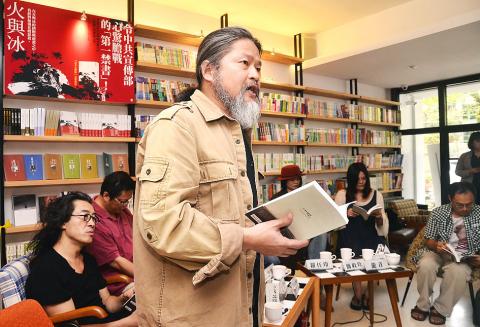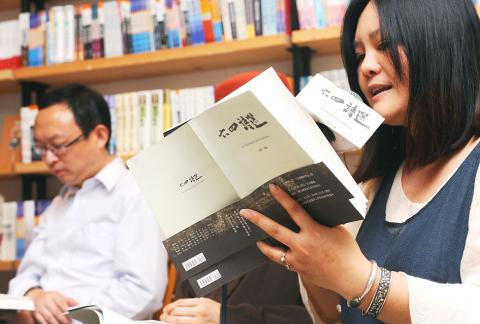The collected works of more than 100 poets from Taiwan, China and Hong Kong have been published ahead of the 25th anniversary of the 1989 Tiananmen Square Massacre.
The authors have condemned China’s attempt to erase the brutal event from people’s memories, saying that they intend to use poetry to forever etch the event in history.
“Poets should be the witnesses and storytellers of the time. And we certainly have not given up on writing about this historic event,” Meng Lang (孟浪), a Hong Kong-based exiled Chinese poet, who is the editor of the collection, An Anthology of June Fourth Poetry (六四詩選), told reporters at the launch in Taipei yesterday.

Photo: Chen Yi-chuan, Taipei Times
Featured in the collection are prominent Chinese dissidents, such as imprisoned Nobel Peace Prize laureate Liu Xiaobo (劉曉波) and Wang Dan (王丹) — a former Tiananmen student leader who is now teaching at National Tsing Hua University — along with poets during the past 25 years who have focused on the theme of the bloody crackdown on pro-democracy demonstrators in Beijing on the nights of June 4 and June 5, 1989.
What happened 25 years ago was a classic example of Beijing using state violence against peaceful and nonviolent protesters, “but what was worse is that the regime has been trying to erase it from people’s memories and the country’s history by censoring the Internet and oppressing those who talk about it,” Meng said.
At least five academics out of more than a dozen who attended a recent forum on the massacre have been detained by Beijing, he said.

Photo: Chang Chia-ming, Taipei Times
Yu Jie (余杰), an exiled author, said at the time, as a 16-year-old who lived in Chengdu, Sichuan Province, that he did not witness the massacre, but that the experience “was a rite of passage that came early for me, because later I was determined to engage in democracy advocacy without regret.”
Yu, 41, collaborated with the victims’ families and advocates of freedom to promote his democracy campaign, but after his publications were banned in China in 2004 and in 2012, he was forced to seek exile in the US.
Several Taiwanese poets whose works were included in the collection also expressed strong feelings about the incident.
Lung Ching (龍青), who was born in China and relocated to Taiwan at the age of 23, said that she viewed the massacre as irrelevant at first, but her feelings changed dramatically afterward because “as long as you’re a human being, you cannot but feel the urge to speak out for the victims.”
“A person’s greatness was undeniable when they were seen trying to fight the system on their own, which was what happened in June 1989,” Lo Jen-ling (羅任玲) said, adding that she was deeply moved by “the tank man,” an anonymous protester who stood in front of a column of tanks on June 5, 1989, in a bid to stop them moving forward.
Lo has used poetry as an emotional outlet, she said.
Published in Hong Kong on May 4, the book is expected to be released soon in Taiwan, according to the publisher.
See Activists on page 5
and stories on page 12

The manufacture of the remaining 28 M1A2T Abrams tanks Taiwan purchased from the US has recently been completed, and they are expected to be delivered within the next one to two months, a source said yesterday. The Ministry of National Defense is arranging cargo ships to transport the tanks to Taiwan as soon as possible, said the source, who is familiar with the matter. The estimated arrival time ranges from late this month to early next month, the source said. The 28 Abrams tanks make up the third and final batch of a total of 108 tanks, valued at about NT$40.5 billion

Travel agencies in Taiwan are working to secure alternative flights for travelers bound for New Zealand for the Lunar New Year holiday, as Air New Zealand workers are set to strike next week. The airline said that it has confirmed that the planned industrial action by its international wide-body cabin crew would go ahead on Thursday and Friday next week. While the Auckland-based carrier pledged to take reasonable measures to mitigate the impact of the workers’ strike, an Air New Zealand flight arriving at Taipei from Auckland on Thursday and another flight departing from Taipei for Auckland on Saturday would have to

A group from the Taiwanese Designers in Australia association yesterday represented Taiwan at the Midsumma Pride March in Melbourne. The march, held in the St. Kilda suburb, is the city’s largest LGBTQIA+ parade and the flagship event of the annual Midsumma Festival. It attracted more than 45,000 spectators who supported the 400 groups and 10,000 marchers that participated this year, the association said. Taiwanese Designers said they organized a team to march for Taiwan this year, joining politicians, government agencies, professionals and community organizations in showing support for LGBTQIA+ people and diverse communities. As the first country in Asia to legalize same-sex

MOTIVES QUESTIONED The PLA considers Xi’s policies toward Taiwan to be driven by personal considerations rather than military assessment, the Epoch Times reports Chinese President Xi Jinping’s (習近平) latest purge of the Chinese People’s Liberation Army (PLA) leadership might have been prompted by the military’s opposition to plans of invading Taiwan, the Epoch Times said. The Chinese military opposes waging war against Taiwan by a large consensus, putting it at odds with Xi’s vision, the Falun Gong-affiliated daily said in a report on Thursday, citing anonymous sources with insight into the PLA’s inner workings. The opposition is not the opinion of a few generals, but a widely shared view among the PLA cadre, the Epoch Times cited them as saying. “Chinese forces know full well that